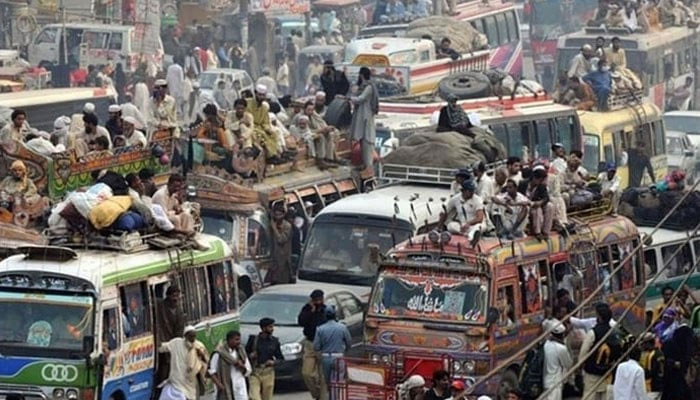PSVs increase stop-to-stop fare
Islamabad : Public service vehicles (PSVs) plying on different routes of twin cities continue to rip off citizens. They have a habit of cheating the citizens by charging exorbitant rates.
“Vehicle owners do not provide fare lists to passengers, making it hard for commuters to know the correct fares. Various kinds of vehicles, including Suzukis, wagons, mini-buses, taxis, Bykeas, and Chinchi (Qingqi) rickshaws, are overcharging passengers. The authorities ignore this issue, which adds to the public’s frustration,” says Harsam Raza.
“A large number of commuters travel on routes through local transport. But, authorities concerned have left the public on the sweet will of public transport owners not taking action against them,” says Haani Abbas.
“The malpractices of the Rawalpindi public transport vehicles are unending. Most of the transporters are greedy and selfish by nature.
They try to maximise their profit by unlawful methods. The increasing rate of petrol has provided them a pretext to fleece the people,” says Altaf Ahmad.
“Due to overpopulation, the number of passengers is increasing. Owners exploit the situation and overload their vehicles. This makes every passenger very uncomfortable. On public complaints, the transport authority should confiscate public transport vehicles for charging excessive fares and overloading,” says Meesam Ali.
“Vehicles failed to reduce fares despite a significant drop in fuel prices per litre over the past month. Vehicle fares did not reflect the fuel price decrease, causing inconvenience to passengers.
After a drastic hike of per litre in fuel prices, vehicles in Rawalpindi unilaterally increase the intra-city fare,” says Shahid Hussain.
“The drivers and conductors of public service vehicles have been violating the fare list issued by the transport authority and charging increased stop-to-stop fares against the fixed fare,” says Waje Haider.
“Citizens have repeatedly complained against overloading of public transport vehicles, especially the wagons, in which they use the small space behind the driver’s seat meant for luggage to accommodate at least three passengers,” says Abul Fazal.
“Particularly for women passengers, the agony is all the more severe. In the overloaded, leg-space-starved wagons, women passengers are only allowed to be seated next to the driver’s seat, where at most two can be accommodated,” says Nawera Batool.
“The drivers also alter the wagons to add extra seats, severely restricting leg space.
The residents also complain about overcharging, not completing routes, and misbehaviour on the part of the conductors,” says Ashiq Hasan.
“As many as twenty passengers are being hauled into the wagon that is originally built to seat no more than fourteen. Moreover, the conductors repeatedly overcharge commuters and fares skyrocket during the seven days in a week,” says Kazim Ali.
Muhammad Hasnain says, “Residents of twin cities complain that taxi drivers are charging high fares, pretending to be running the taxis on patrol, but almost all such vehicles are being run on CNG.”
-
 Caleb McLaughlin Shares His Resume For This Major Role
Caleb McLaughlin Shares His Resume For This Major Role -
 King Charles Carries With ‘dignity’ As Andrew Lets Down
King Charles Carries With ‘dignity’ As Andrew Lets Down -
 Brooklyn Beckham Covers Up More Tattoos Linked To His Family Amid Rift
Brooklyn Beckham Covers Up More Tattoos Linked To His Family Amid Rift -
 Shamed Andrew Agreed To ‘go Quietly’ If King Protects Daughters
Shamed Andrew Agreed To ‘go Quietly’ If King Protects Daughters -
 Candace Cameron Bure Says She’s Supporting Lori Loughlin After Separation From Mossimo Giannulli
Candace Cameron Bure Says She’s Supporting Lori Loughlin After Separation From Mossimo Giannulli -
 Princess Beatrice, Eugenie Are ‘not Innocent’ In Epstein Drama
Princess Beatrice, Eugenie Are ‘not Innocent’ In Epstein Drama -
 Reese Witherspoon Goes 'boss' Mode On 'Legally Blonde' Prequel
Reese Witherspoon Goes 'boss' Mode On 'Legally Blonde' Prequel -
 Chris Hemsworth And Elsa Pataky Open Up About Raising Their Three Children In Australia
Chris Hemsworth And Elsa Pataky Open Up About Raising Their Three Children In Australia -
 Record Set Straight On King Charles’ Reason For Financially Supporting Andrew And Not Harry
Record Set Straight On King Charles’ Reason For Financially Supporting Andrew And Not Harry -
 Michael Douglas Breaks Silence On Jack Nicholson's Constant Teasing
Michael Douglas Breaks Silence On Jack Nicholson's Constant Teasing -
 How Prince Edward Was ‘bullied’ By Brother Andrew Mountbatten Windsor
How Prince Edward Was ‘bullied’ By Brother Andrew Mountbatten Windsor -
 'Kryptonite' Singer Brad Arnold Loses Battle With Cancer
'Kryptonite' Singer Brad Arnold Loses Battle With Cancer -
 Gabourey Sidibe Gets Candid About Balancing Motherhood And Career
Gabourey Sidibe Gets Candid About Balancing Motherhood And Career -
 Katherine Schwarzenegger Shares Sweet Detail From Early Romance Days With Chris Pratt
Katherine Schwarzenegger Shares Sweet Detail From Early Romance Days With Chris Pratt -
 Jennifer Hudson Gets Candid About Kelly Clarkson Calling It Day From Her Show
Jennifer Hudson Gets Candid About Kelly Clarkson Calling It Day From Her Show -
 Princess Diana, Sarah Ferguson Intense Rivalry Laid Bare
Princess Diana, Sarah Ferguson Intense Rivalry Laid Bare




